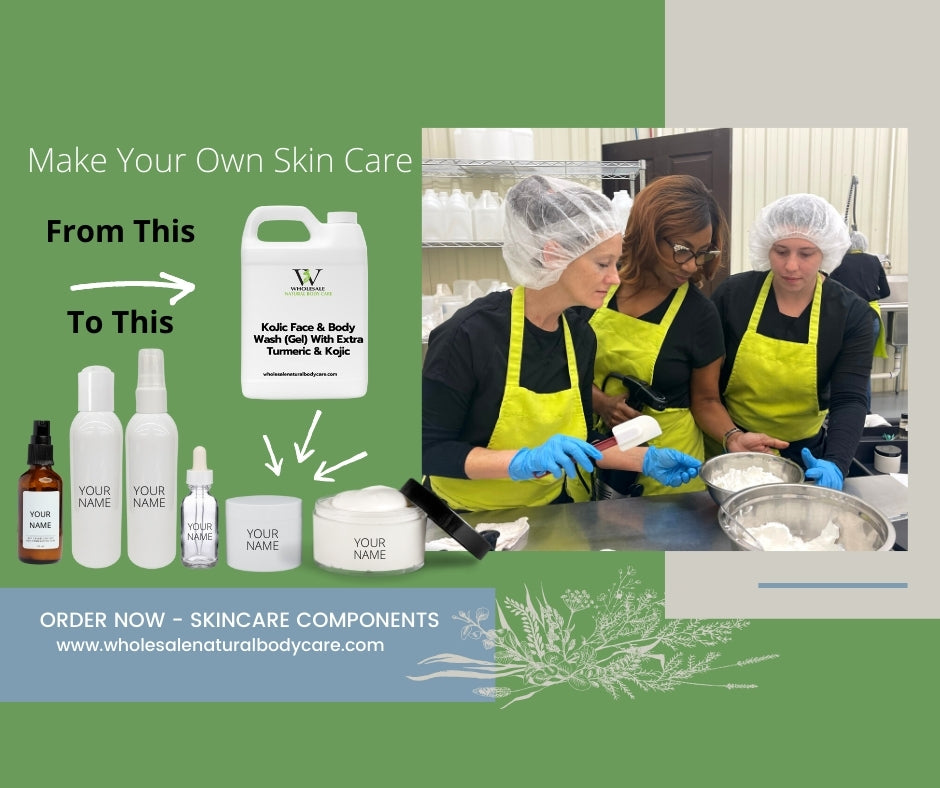Making your own skincare products using WNBC Bases can be a fun and rewarding way to take care of your skin while also having control over the ingredients you use. Not only can you tailor the products to your individual needs and preferences, but you can also save money in the long run.
Before getting started, it's important to note that making your own skincare products requires a bit of research and caution. You want to make sure you're adding safe ingredients like extracts and extra natural fixed oils to benefit the skin concern you are targeting. Additionally you want to make sure that you are handling them properly to avoid any adverse reactions. With that in mind, here are some steps you can take to make your own skincare products:
1. Determine your skin type and concerns. Understanding your skin type and any specific concerns you may have will help you choose the right ingredients for your DIY skincare products. For example, if you have oily skin, you may want to use ingredients that help control oil production, such as clay or witch hazel. If you have dry skin, you may want to use ingredients that provide hydration, such as aloe vera or hyaluronic acid.
2. Choose your ingredients. Once you know your skin type and concerns, you can start researching ingredients that will work well for you. Some common ingredients used in DIY skincare include carrier oils (such as jojoba or almond oil), essential oils (such as lavender or tea tree oil), herbs (such as chamomile or calendula), and natural butters (such as shea or cocoa butter). Be sure to do your research and make sure any ingredients you use are safe and appropriate for your skin type.
3. Gather your supplies. You'll need some basic supplies to make your own skincare products, such as measuring cups and spoons, mixing bowls, and storage containers. You may also need a blender or food processor to mix certain ingredients together. Make sure all of your supplies are clean and sanitized before using them.
4. Experiment with your favorite ingredients. Don't be afraid to experiment and come up with your own recipes as well. Start with simple recipes and adjust them to your liking as you go. Keep notes on what works well and what doesn't, so you can make adjustments in the future.
5. Store your products properly. Since your "Made It Yourself" skincare products will be made and packaged by you, it's important to store them properly to prevent bacteria growth. Store your products in a cool, dry place and use them within a reasonable amount of time.
In conclusion, making your own skincare products can be a fun and rewarding way to take care of your skin. Just be sure to do your research, use safe ingredients, and store your products properly. With a bit of experimentation and creativity, you can create custom skincare products that work well for your individual needs.
Tips: Select amazing additives like:
Hyaluronic Acid - HA is a versatile ingredient that can be used in a variety of skincare products, including moisturizers, serums, and masks. It's generally well-tolerated by all skin types, including sensitive skin, and can be used both morning and night.
Botanical Extracts - Here are some common botanical extracts used in facial skincare bases that you purchase from WNBC:
-
Green tea extract: Green tea is rich in antioxidants called catechins, which help protect the skin against environmental stressors like pollution and UV rays. Green tea extract is also known to have anti-inflammatory properties and can help reduce redness and irritation.
-
Chamomile extract: Chamomile is a soothing herb that is known for its anti-inflammatory and antioxidant properties. Chamomile extract can help calm and soothe the skin, making it a great ingredient for those with sensitive or irritated skin.
-
Aloe vera extract: Aloe vera is a succulent plant that is known for its hydrating and soothing properties. Aloe vera extract can help moisturize the skin and reduce inflammation, making it a popular ingredient in moisturizers, serums, and masks.
-
Calendula extract: Calendula is a flower that is known for its anti-inflammatory and healing properties. Calendula extract can help soothe irritated or inflamed skin, making it a great ingredient for those with acne-prone or sensitive skin.
-
Rose extract: Roses are rich in vitamins and antioxidants, making them a popular ingredient in skincare products. Rose extract can help hydrate the skin, reduce inflammation, and improve overall skin tone and texture.
-
Licorice extract: Licorice root contains a compound called glycyrrhizin, which has anti-inflammatory and antioxidant properties. Licorice extract can help brighten the skin and reduce the appearance of dark spots and hyperpigmentation.
Exclusive Natural Fixed Oils - Natural oils are a great way to nourish and hydrate the skin and can be easily added to Wholesale Natural Body Care's Creams, Serums, Cleansers and lotions. They're rich in essential fatty acids, vitamins, and antioxidants, which can help improve skin texture, reduce inflammation, and protect against environmental stressors. Here are some natural oils that are commonly used in facial skincare. All you need to do is measure, add and blend:
-
Jojoba oil: Jojoba oil is a light, non-greasy oil that is easily absorbed by the skin. It's rich in vitamins E and B, and contains essential fatty acids that help moisturize and protect the skin. Jojoba oil is great for all skin types, especially those with oily or acne-prone skin.
-
Rosehip oil: Rosehip oil is a great source of vitamins C and A, as well as essential fatty acids. It's known for its hydrating and anti-aging properties, and can help improve skin tone and texture. Rosehip oil is a good option for those with dry or mature skin.
-
Argan oil: Argan oil is a rich, nourishing oil that is high in antioxidants and essential fatty acids. It can help moisturize the skin and protect against environmental stressors, making it a great option for those with dry or damaged skin.
-
Coconut oil: Coconut oil is a versatile oil that can be used for a variety of skincare purposes. It's rich in lauric acid, which has antimicrobial properties that can help fight acne-causing bacteria. It's also a good source of essential fatty acids, which help hydrate and nourish the skin.
-
Grapeseed oil: Grapeseed oil is a lightweight, non-greasy oil that is easily absorbed by the skin. It's rich in antioxidants and essential fatty acids, and can help improve skin texture and reduce inflammation. Grapeseed oil is a good option for those with oily or acne-prone skin.
When using natural oils in facial skincare, it's important to choose high-quality oils that are free from additives and preservatives. It's also important to use the oils in moderation and to avoid using too much at once, as this can lead to clogged pores and breakouts. It's best to start with a small amount and gradually increase if needed.
Essential Oils - I have listed a few essential oils that are commonly used in facial skincare. Remember to only use a very small amount to be used on your face:
-
Tea tree oil: Tea tree oil is a powerful antiseptic that can help kill acne-causing bacteria and reduce inflammation. It's a great ingredient for those with oily or acne-prone skin, but should be used with caution as it can be drying and irritating in high concentrations.
-
Lavender oil: Lavender oil is known for its calming and soothing properties. It can help reduce inflammation and redness, making it a good option for those with sensitive or irritated skin.
-
Chamomile oil: Chamomile oil is known for its anti-inflammatory and calming properties. It can help soothe and hydrate the skin, making it a good option for those with dry or sensitive skin.
-
Frankincense oil: Frankincense oil is a powerful anti-aging ingredient that can help improve the appearance of fine lines and wrinkles. It also has anti-inflammatory properties, making it a good option for those with acne-prone skin.
-
Geranium oil: Geranium oil is a natural astringent that can help tighten and firm the skin. It's also known for its balancing properties, making it a good option for those with combination skin.
When using essential oils in facial skincare, it's important to dilute them properly and to patch test any new product before using it all over your face. Essential oils can be irritating and sensitizing in high concentrations, so it's best to start with a low concentration and gradually increase if needed. It's also important to choose high-quality essential oils that are free from synthetic fragrances and other potentially harmful ingredients.





